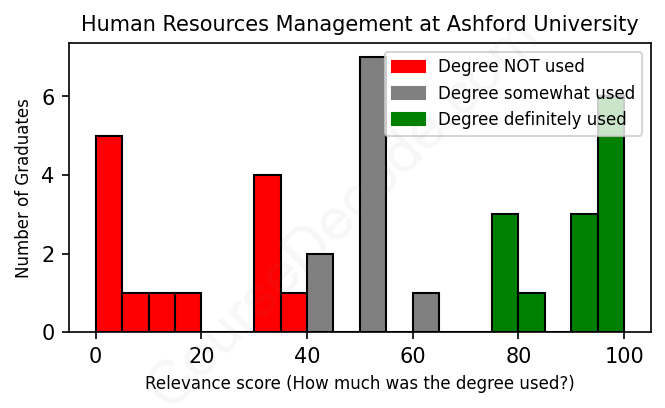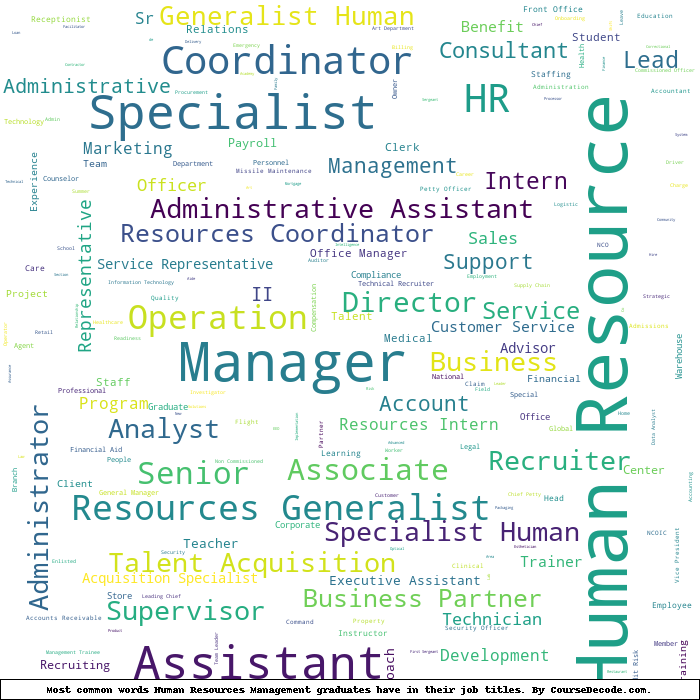
First, some facts. Of the Human Resources Management graduates from Ashford University we've analyzed , here's how many have used (or NOT used) their degree in their career:

These are estimates based on AI analysis of 36 LinkedIn profiles (see below).
The verdict? Significantly below average. Overall, with an average relevance score of 52%, Human Resources Management graduates from Ashford University have a much lower likelihood (-15%) of finding work in this field compared to the average graduate across all fields:
And for comparison, here's the chart for all profiles we've looked at across all degrees.
Also, after graduating, 41% of these graduates have pursued further education other than another Bachelor's degree (such as a Masters degree or other), compared to the average across all profiles of 35%. This suggests you may need more than just a Bachelors degree to be competitive as a Human Resources Management graduate.
See the details:
|
Relevance score: 38% We think this person has NOT gone into a career related to their degree. We think this person has NOT gone into a career related to their degree.
DEGREE INFOGraduated in 2011 from Ashford University with a Bachelor's degree in Human Resources Management. No other secondary education since. JOB HISTORY SINCE GRADUATIONReceptionist / Payroll Assistant / Cashier / Manage Vehicle Stock In Honda of Lake Jackson Jun 2011 - Aug 2012 Customer Relations Manager  Honda of Lake Jackson Jun 2011 - Aug 2012 Human Resources / Payroll Administrator  Honda of Lake Jackson Jun 2011 - Jun 2016 Preschool Teacher  SWEENY CHRISTIAN SCHOOL Aug 2021 - Present Photographer  Watermark Photography 2019 - Present ABOUTNo information provided. |
The top 10 most common jobs done by the graduates we've analyzed (ranked most common to least) are:
From looking at the job history of graduates with a degree in Human Resources Management from Ashford University, it seems like there are a wide variety of roles they’ve taken on, but not all of them are directly relevant to HR. Many have ended up in traditional HR roles such as HR Managers and HR Coordinators, which clearly align with their academic training. These positions typically involve functions like recruitment, employee relations, and benefits administration—everything you'd expect from an HR career. Additionally, there are others who have taken roles like Employee Relations Specialist or Talent Acquisition Coordinator that also make good use of their HR skills.
However, a good number of graduates have opted for jobs that don’t seem to fit the HR mold. You’ve got folks working in retail, customer service, and even teaching, which may involve some applicable interpersonal skills but don’t require specialized HR knowledge day-to-day. Also, many of the roles in logistics or finance do utilize some general management skills but don’t pertain to HR principles directly. So, overall, while there are definitely a fair amount of relevant positions, a significant portion of graduates have found themselves in jobs that only loosely tie back to Human Resources Management. It's a mixed bag for sure!
Here is a visual representation of the most common words in job titles for Human Resources Management graduates (this is across all Human Resources Management graduates we've analyzed, not just those who went to Ashford University):

So, looking at the career paths of people who graduated from Ashford University with a degree in Human Resources Management, it seems like there’s a mix of stability and some diversification in what they’ve chosen to do after college. Right off the bat, many folks started with roles that aren’t purely HR-related, like receptionists, customer relations managers, or administrative assistants. This might be a realistic start since sometimes getting that first job can lead to better opportunities later on. But as they gained experience, a good number started moving into more traditional HR roles, such as HR coordinators, HR managers, and even HR directors within a few years.
Now, if we look five to ten years down the line, it seems like those who stuck with HR are generally climbing the ladder pretty well, transitioning into positions like HR business partners or even specialized roles in talent acquisition and employee relations. Some graduates ended up in management roles in HR, which is a solid sign that their degree has served them well in helping to advance their careers. On the flip side, there are also examples of graduates who veered away from HR, with some choosing to start their own businesses or move into unrelated fields. Overall, while it’s clear that many graduates have found promising careers in HR, the path isn’t entirely linear, and not everyone sticks strictly to the HR track. So, it really comes down to how proactive they are about seeking out opportunities within their field.
So, a Bachelor’s degree in Human Resources Management, whether at Ashford University or elsewhere, is generally considered to be on the easier side compared to some other business degrees. It covers topics like employee relations, organizational behavior, and labor laws, which are usually pretty straightforward and more about understanding human behavior rather than complex math or heavy technical skills. Don't get me wrong, you still need to put in the effort and do your readings, but if you’re interested in the subject and good at communication, you should find it manageable. Plus, because many courses are designed to be applicable to real-world scenarios, you might find the content engaging rather than just dry textbook stuff. Overall, it’s a solid choice if you’re looking for a degree that’s not overly intense.
Most commonly, in the LinkedIn profiles we've looked at, it takes people 2 years to finish a Bachelor degree in Human Resources Management.
So, it looks like the Ashford University grads have had a pretty mixed bag when it comes to their earnings after graduation. Some of them have climbed the ranks to solid positions, like HR Directors and Senior Managers, which usually means they're making decent money—typically, those roles can pull in six figures, especially in larger companies. On the other hand, there are some who have taken roles like teachers or administrative assistants, which generally don't pay as high, especially early on. Plus, a few of them ended up in positions without steady job security, like business owners. Overall, if you stick with the right career path and keep gaining experience, it seems like they can do well financially, but it's definitely not guaranteed for everyone!
Here is a visual representation of the most common words seen in the "about" section of LinkedIn profiles who have a Bachelor degree in Human Resources Management (this is across all Human Resources Management graduates we've analyzed, not just those who went to Ashford University). This may or may not be useful:

Here are all colleges offering a Bachelor degree in Human Resources Management (ordered by the average relevance score of their Human Resources Management graduates, best to worst) where we have analyzed at least 10 of their graduates:
| College | Score | Count |
|---|---|---|
 San Jose State University San Jose State University
|
83 | 14 |
 Western Governors University Western Governors University
|
71 | 50 |
 Saint Leo University Saint Leo University
|
71 | 12 |
 Davenport University Davenport University
|
71 | 11 |
 Capella University Capella University
|
70 | 15 |
 Rutgers University Rutgers University
|
67 | 14 |
 Southern New Hampshire University Southern New Hampshire University
|
66 | 30 |
 Lindenwood University Lindenwood University
|
64 | 11 |
 DeVry University DeVry University
|
63 | 31 |
 University of Maryland Global Campus University of Maryland Global Campus
|
61 | 22 |
 Upper Iowa University Upper Iowa University
|
61 | 12 |
 Columbia Southern University Columbia Southern University
|
59 | 28 |
 Central Michigan University Central Michigan University
|
57 | 15 |
 Colorado Technical University Colorado Technical University
|
57 | 16 |
 American InterContinental University American InterContinental University
|
56 | 24 |
 University of Phoenix University of Phoenix
|
55 | 90 |
 Ashford University Ashford University
|
52 | 36 |
 American Military University American Military University
|
52 | 13 |
 Park University Park University
|
52 | 21 |
 University of Maryland University College University of Maryland University College
|
51 | 15 |
 Strayer University Strayer University
|
47 | 31 |